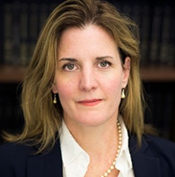 Hon. Kathleen Waterman-Marshall was born in East Harlem and raised in downtown Manhattan in a family committed to civil and community service. A proud graduate of Adelphi University, where she obtained a B.A. in the Honors Program in Liberal Studies on scholarship, and a proud graduate of Benjamin N. Cardozo School of Law, she is the first of her family to achieve college and post-graduate degrees. Inspired by the experiences and strength of her older sister, Jeanine, who passed in 1998 from complications due to spina bifida, Justice Waterman-Marshall joined the legal profession to protect the most vulnerable and to advance equality and justice.
Hon. Kathleen Waterman-Marshall was born in East Harlem and raised in downtown Manhattan in a family committed to civil and community service. A proud graduate of Adelphi University, where she obtained a B.A. in the Honors Program in Liberal Studies on scholarship, and a proud graduate of Benjamin N. Cardozo School of Law, she is the first of her family to achieve college and post-graduate degrees. Inspired by the experiences and strength of her older sister, Jeanine, who passed in 1998 from complications due to spina bifida, Justice Waterman-Marshall joined the legal profession to protect the most vulnerable and to advance equality and justice.
As a jurist dedicated to promoting access to legal education and encouraging young people to pursue careers in the law, Justice Waterman-Marshall created “LIT: Lawyers In Training Program,” a free six-to-ten-week basic law course offered to NYC high school students as an introduction to legal thinking, writing and lawyering skills. She teaches the program in the summers, on a volunteer basis, in association with community organizations. Justice Waterman-Marshall also teaches legal writing at the law school level – she has been an Adjunct Professor of Law in the Legal Writing Department of Cardozo Law School since 2016, introducing first-year and international LLM law students to the ethical practice of law. She is passionate about mentorship and has worked with interns from law school, college, and high school every year since taking the bench.
Justice Waterman-Marshal began her judicial career in January 2019, upon her election to the NYC Civil Court. Her first assignment was as an Acting Family Court Judge in Kings County Family Court, where she presided over high-conflict custody, family offense, child protective, and juvenile justice matters throughout the height of the pandemic. In December 2021, Justice Waterman-Marshall was appointed to Supreme Court Justice status in New York County. In this role, she has presided over hotly contested divorce cases involving delicate custody and complicated financial issues; Parentage Proceedings; complex “Junior Commercial” cases; and a wide-variety of general civil lawsuits and jury trials. She is highly regarded for her even-handed, patient temperament on the bench and clear, well-reasoned decisions.
Justice Waterman-Marshall was the first judge to interpret and apply an amendment to the Domestic Relations Law that now requires the court to consider domestic violence in the distribution of marital assets, thus redressing upon a divorce the real harms of emotional and physical abuse and financial coercive control that occurred during the marriage (J.N. v. T.N., 77 Misc. 3d 894, 182 N.Y.S.3d 497 [N.Y. Sup. Ct. 2022]; see “The ‘Bad Actor Syndrome’ in Matrimonial and Family Law: The Misbehaving Spouse or Parent,” Alton L. Abramowitz and Leigh Baseheart Kahn, New York Law Journal, September 20, 2024; “Mr. Bumble and the Role of Fault in Equitable Distribution,” Timothy M. Tippins, New York Law Journal, January 4, 2024, Expert Analysis; 11 N.Y.Prac., New York Law of Domestic Relations § 14:75).
Prior to becoming a judge, Justice Waterman-Marshall was a trial attorney for twenty years, handling a diverse range of civil matters involving issues important to everyday New Yorkers, in the New York State and Federal trial and appellate courts. After honing her litigation skills as an associate attorney with New York City law firms, she opened a women-owned law office representing small businesses and individuals. In 2010, Justice WatermanMarshall transitioned from the private to the public sector, taking a position in a non-profit law firm that represented children in high conflict custody and neglect proceedings. She returned briefly to private practice before taking a position as the Principal Law Clerk to Supreme Court Justice Arthur F. Engoron in 2014.
Justice Waterman-Marshall is committed to improving the courts and legal profession, and is an active member of several bar associations at the State and local levels. She works on committees and task forces to create and implement efficient rules of practice, to advance racial equity in the Courts and to provide broader access to justice by use of current technologies. She regularly participates on bar association and community panels and presents on substantive issues, trial practice, and the use of ADR.
